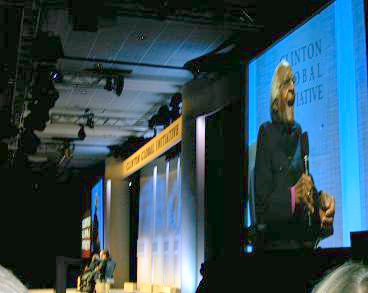CGI: There will be many more Posts
The 2006 Clinton Global Initiative Meeting may be over, but I haven't begun to advise you readers about all the conversations that took place over the past three days. It's been exhausting, yet exhilarating. I am reminded of the days when William Jefferson Clinton was presiding over a nation that the people of the globe looked up to with hope that it would become a better world with expanded human rights - with the help of America. I am reminded of a day when world leaders worked in good faith partnership with America.
9/11 didn't undo America. I don't believe it ever could. But foreign policy mistakes have been made - before and after 9/11 - but they've been especially glaring errors on the messy road we've taken since we began an unjust war that has caused already desperate people in places like Iraq to feel more despairing; more abandoned. A war on terror will never be won as long as we remain on the same road.
I heard and saw a lot of different people speaking this week. Many of them were world leaders. I heard many perspectives, and through the next few weeks I'll be sharing some of those perspectives with you - through the lens of poverty alleviation, global health issues, religious and ethnic reconciliation, and energy/climate change.
If there's any message that I think most people got (and gave back through astoundingly generous economic commitments), it would be "don't lose hope, and don't sit and do nothing. You may be the leader for whom someone in this world is crying out. You're not alone - none of us are alone. As Archbishop Desmond Tutu said this week, anyone who can say they are totally self-sufficient is admitting that they're sub-human. We were not created to go this alone.
I heard about compassion, justice, and love this week. And I know it wasn't just lip service. It was visceral. It didn't make perfect economic sense, but it made common sense when it comes to having decent values in a free and, compared to many other parts of the developing world, a very wealthy society. It came from caring. It was presented and handled with great respect and honor. The next time you bash a corporation, check to see if, how, and to what extent they are dealing with social responsibility issues. We're all going to be paying attention to the corporations who do nothing. Government cannot save the world on its own. It's going to take all of us in our own way.
I really think the participants and leaders of the CGI meeting are onto something that's going to help all of us understand that we must go beyond ourselves..if we are to survive together, we will have to transcend toward a thriving, healthy, safe, and secure world that we can be proud of leaving behind for the children of this world. I'm talking about all the world, not just our own corner of it. Our family - the family of man temporarily sharing this earth - depends upon this sense of shared responsibility.
- Jude





